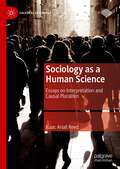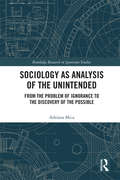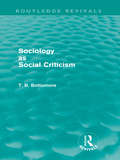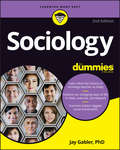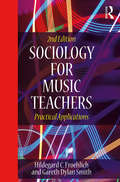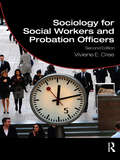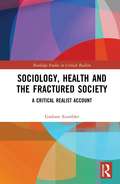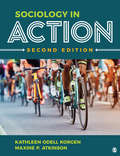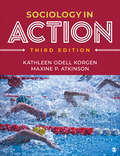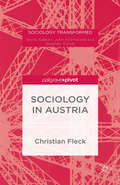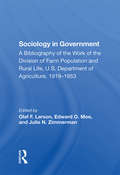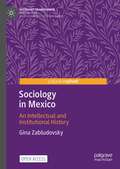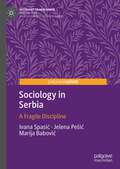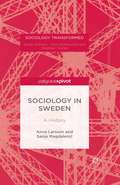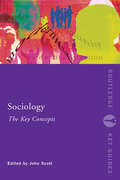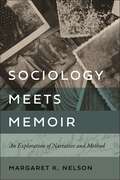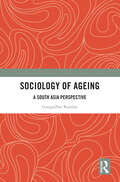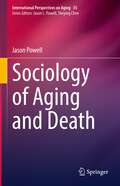- Table View
- List View
Sociology as a Human Science: Essays on Interpretation and Causal Pluralism (Cultural Sociology)
by Isaac Ariail ReedSociology as a Human Science is a set of foundational, wide-ranging and updated essays from Isaac Ariail Reed. Gathered together for the first time with a new introduction, they articulate a distinct perspective on concept and method in social science. Reed writes about realism and positivism, postmodernism and empiricism, mechanisms and causality, and power and history, developing thereby an understanding of the key debates out of which 21st-century sociology has developed. Carefully considering all manner of arguments in metatheory and epistemology and moving towards a program of interpretive explanation focused on culture and power, Reed places sociology at the center of debates about knowledge production across the humanities and social sciences. His reconstructive approach, positioned “after the posts” (poststructuralism, postmodernism, and postcolonialism) provides a way for interpretive sociology to provide analytically sound, theoretically extensive, and empirically rich understandings of social life.
Sociology as a Population Science
by John H. GoldthorpeJohn Goldthorpe is one of Britain's most eminent sociologists and a strong advocate of quantitative sociology. In this concise and accessible book, he provides a new rationale for recent developments in sociology which focus on establishing and explaining probabilistic regularities in human populations. Through these developments, Goldthorpe shows how sociology has become more securely placed within the 'probabilistic revolution' that has occurred over the last century in the natural and social sciences alike. The central arguments of the book are illustrated with examples from different areas of sociology, ranging from social stratification and the sociology of the family to the sociology of revolutions. He concludes by considering the implications of these arguments for the proper boundaries of sociology, for its relations with other disciplines, and for its public role.
Sociology as Analysis of the Unintended: From the Problem of Ignorance to the Discovery of the Possible (Routledge Research in Ignorance Studies)
by Adriana MicaSociology of unintended consequences is commonly depicted as a framework for understanding the outcomes that run counter to the initial intentions of social actors because of factors such as ignorance, error and complexity. This conventional approach, however, is now undergoing change under the influence of more encompassing shifts in framing in social sciences. Indeed, in the last few years, the study of the unintended has evidently moved from the question "What are the sources of the unintended?" to the inquiry "What is it that makes the unintended possible?" or "What risks, but also opportunities, do the unintended entail?" Explaining this puzzle in relation to the internal dynamics of sociology of unintended consequences, Adriana Mica makes an erudite journey in relation to its three main analytical frameworks, their semantic shifts, setbacks and theoretical revivals. Certainly, through the examination of the use of protective headgear in boxing, this volume renders explicitly the possibilistic turn not only in the specific research of the unintended, but in sociology more generally. Presenting the contributions of leading sociology theorists in a new light, Sociology as Analysis of the Unintended will appeal to graduate students and researchers interested in fields such as theoretical sociology, sociology of substantive issues and sociology of sport.
Sociology as Social Criticism (Routledge Revivals)
by Tom B. BottomoreFirst published in 1975, this collection of essays embodies a conception of sociological thought as a critical analysis of social theories and doctrines, of social institutions and political regimes, of recent social movements. They deal, in particular, with some conservative versions of sociology and with attempts to develop more radical theories; they extend the author's previous writings on classes, elites and politics; and they analyse some of the problems of socialism in the late twentieth century. There is a close unity of theme througout the book in its critical attempt to formulate new intellectual bases for future radical and egalitarian politics. It is written with that quiet wisdom and impressive command of sources which readers have come to associate with Professor Bottomore's work.
Sociology class 8 - Karnataka board: ಸಮಾಜಶಾಸ್ತ್ರ 8 ನೇ ತರಗತಿ - ಕರ್ನಾಟಕ ಮಂಡಳಿ
by Karnataka Patyapusthaka SanghaSociology text book for 8th standard kannada medium, Karnataka State
Sociology For Dummies
by Jay GablerUnderstand how society works—and how to make it betterIt’s impossible to exist in the contemporary world without being aware that powerful social forces, ideas, and movements—#MeToo, climate change, and Black Lives Matter to name just a few—are having far-reaching impacts on how we think and live. But why are they happening? And what are their likely effects? The new edition of Sociology For Dummies gives you the tools to step back from your personal experience and study these questions objectively, testing the observable phenomena of the human world against established theories and making usable sense of the results.In a friendly, jargon-free style, sociologist and broadcaster Jay Gabler introduces you to sociology’s history and basic methods, and—once you have your sociological lens adjusted—makes it clear how to survey the big questions of culture, gender, ethnicity, religion, politics, and crime with new eyes. You’ll find everything you need to succeed in an introductory sociology class, as well as to apply sociological ideas to give you extra insight into your personal and professional life. Get a working knowledge of Sociology 101 Understand how human communities work Engage more deeply with debates on social justice, healthcare, and more Interpret and use sociological methods and research Whether you’re studying sociology at school or just want to gain deeper insight into our collective life, Sociology For Dummies gives you the tools to understand the mechanisms of the human world—and the knowledge to influence how they work for the better.
Sociology for Music Teachers: Practical Applications
by Gareth Dylan Smith Hildegard C. FroehlichFor upper level undergraduate and introductory graduate and doctoral courses in music education. Outlining the basic aspects, constructs and concepts relevant to understanding music teaching and learning from a sociological perspective, this volume introduces students to the discipline as a tool in understanding their own work. The text shows how certain academics in music, sociology and education have thought about the relationship of music to education, schooling and society and examines the consequences of such thinking for making instructional choices in teaching methods and repertoire selection. School music teaching is imbedded in two major societal traditions: (1) the tradition of music making, listening, and responding; and (2) the tradition of education as a societal mandate. The first tradition holds firmly to music artistry and musicological scholarship, the latter of which includes music sociology. The second tradition, that of education as a field of study, relies mostly on pedagogical principles rooted equally in psychology and sociology. Hildegard Froehlich bases the book upon the premise that a music teacher's work is equally shaped by both traditions. The more music teachers become aware of how societal structures shape their own lives as well as the lives of their students, colleagues, and superiors; the more "reality-based" their teaching will become. Society is a composite of communities in which different social classes, groups, and reference groups co-exist-to varying degrees of compatibility due to real or perceived differences in norms and values as well as hierarchies of power. Informed or intuitive choices made by an individual indicate allegiances to particular groups, how those groups are structured hierarchically; and where and how each individual fits into those hierarchies. This is true for the music world as it is true for the world of education.
Sociology for Social Work: An Introduction
by Alastair Gibson Chris YuillThis excellent textbook introduces the social work student to the field of sociology, illustrating how sociology is connected to and fundamental to effective social work practice. Each chapter applies theory to practice and is uniquely co-written by a sociologist, social worker and service user. A wide range of topics and subjects relevant to social work are covered, including: -Gender -Class -Ethnicity and race -Ageing -Health -Intimacies -Social exclusion -Crime and deviance -Communities -Disability The book comes with access to an exciting companion website offering the reader downloads, web links, powerpoint slides and case studies. Every chapter of the book further includes further case studies, along with lots of clear definitions of terms, and reflection points, making this book the essential introductory text for all social work students.
Sociology for Social Workers and Probation Officers
by Viviene E. CreeHow does a social work student make the connection between sociological knowledge and day-to-day social work? Sociology for Social Workers and Probation Officers provides an introduction to sociological ideas and research and places them firmly into the context of actual social work practice. It encourages readers to develop critical awareness and reach their own judgements about the usefulness and implications of holding certain conceptual positions and shows how social work can be better informed and improved by doing so. Fully revised and updated throughout, this second edition examines sociology in relation to key areas of social work and probation practice, and includes one new chapter. Areas covered are: Family Childhood Youth Community Care and Caring Health and Illness Crime. Essential reading for all social work and probation studies students, this text looks beyond individual and psychological explanations and solutions to develop a sociological knowledge base for social work practice.
Sociology, Health and the Fractured Society: A Critical Realist Account (Routledge Studies in Critical Realism)
by Graham ScamblerIt is now accepted that many of the determinants of health and health care are social. This volume offers a philosophical and theoretical frame within which the nature and extent of this might be optimally examined. The analysis is rooted in Roy Bhaskar’s basic and dialectical critical realism, although it draws also on the critical theory of Jurgen Habermas. It purports to provide an ontologically and epistemologically grounded comparative sociology of contemporary health and health care in the twenty-first century. Carrying a fourfold agenda, the volume sets out a dialectical critical realist frame for a comparative sociology of health and health care; it clarifies sociology’s potential and limitations; it suggests a research programme and a series of questions for investigation; and it offers an argument for an action sociology embedded in a dialectical theory of transformative action. This volume will be of interest to students and scholars in the areas of philosophy, sociology and critical realism, as well as those working in health and social care.
Sociology in Action
by Kathleen Odell Korgen Maxine P. AtkinsonWake up your introductory sociology classes! Sociology in Action helps your students learn sociology by doing sociology. Sociology in Action by Kathleen Odell Korgen and Maxine P. Atkinson will inspire your students to do sociology through real-world activities designed to increase learning, retention, and engagement with course material. Packed with new activities and thought-provoking questions to help explain key concepts, the Second Edition of this innovative bestselling text immerses students in an active learning experience that emphasizes hands-on work, application, and learning by example. Each chapter has been updated to reflect recent societal changes including: the causes for and ramifications of the 2016 election; the latest issues facing the LGBT community, people of color, immigrants and refugees, and the shrinking middle class; and student loan debt. The comprehensive Activity Guide that accompanies the text provides everything you need to assign, carry out, and assess the activities that will best engage your students, fit the format of your course, and meet your course goals. Also available as a digital option (courseware). Contact your rep to learn more about Sociology in Action, Second Edition - Vantage Digital Option.
Sociology in Action
by Kathleen Odell Korgen Maxine P. AtkinsonWake up your introductory sociology classes! Sociology in Action helps your students learn sociology by doing sociology. Sociology in Action by Kathleen Odell Korgen and Maxine P. Atkinson will inspire your students to do sociology through real-world activities designed to increase learning, retention, and engagement with course material. Packed with new activities and thought-provoking questions to help explain key concepts, the Second Edition of this innovative bestselling text immerses students in an active learning experience that emphasizes hands-on work, application, and learning by example. Each chapter has been updated to reflect recent societal changes including: the causes for and ramifications of the 2016 election; the latest issues facing the LGBT community, people of color, immigrants and refugees, and the shrinking middle class; and student loan debt. The comprehensive Activity Guide that accompanies the text provides everything you need to assign, carry out, and assess the activities that will best engage your students, fit the format of your course, and meet your course goals. Also available as a digital option (courseware). Contact your rep to learn more about Sociology in Action, Second Edition - Vantage Digital Option.
Sociology in Action
by Kathleen Odell Korgen Maxine P. AtkinsonSociology in Action, Third Edition is an introductory text that encourages doing sociology through real-world activities that emphasize hands-on work, application, and learning by example. Each chapter is written by a specialist in that subject who also shares a passion for active learning. Edited by Kathleen Odell Korgen and Maxine P. Atkinson, this text explains sociology′s key concepts and theories, and pairs that foundational coverage with a series of carefully developed, assignable learning activities that prompt students to think and reflect, observe, analyze, investigate, and apply what they are learning. This title is accompanied by a complete teaching and learning package. Contact your SAGE representative to request a demo. Learning Platform / Courseware SAGE Vantage is an intuitive learning platform that integrates quality SAGE textbook content with assignable multimedia activities and auto-graded assessments to drive student engagement and ensure accountability. Unparalleled in its ease of use and built for dynamic teaching and learning, Vantage offers customizable LMS integration and best-in-class support. It’s a learning platform you, and your students, will actually love. Learn more. Assignable Video with Assessment Assignable video (available in SAGE Vantage) is tied to learning objectives and curated exclusively for this text to bring concepts to life. Watch a sample video now. LMS Cartridge: Import this title’s instructor resources into your school’s learning management system (LMS) and save time. Don’t use an LMS? You can still access all of the same online resources for this title via the password-protected Instructor Resource Site. Learn more.
Sociology in Action
by Kathleen Odell Korgen Maxine P. AtkinsonSociology in Action, Third Edition is an introductory text that encourages doing sociology through real-world activities that emphasize hands-on work, application, and learning by example. Each chapter is written by a specialist in that subject who also shares a passion for active learning. Edited by Kathleen Odell Korgen and Maxine P. Atkinson, this text explains sociology′s key concepts and theories, and pairs that foundational coverage with a series of carefully developed, assignable learning activities that prompt students to think and reflect, observe, analyze, investigate, and apply what they are learning. This title is accompanied by a complete teaching and learning package. Contact your SAGE representative to request a demo. Learning Platform / Courseware SAGE Vantage is an intuitive learning platform that integrates quality SAGE textbook content with assignable multimedia activities and auto-graded assessments to drive student engagement and ensure accountability. Unparalleled in its ease of use and built for dynamic teaching and learning, Vantage offers customizable LMS integration and best-in-class support. It’s a learning platform you, and your students, will actually love. Learn more. Assignable Video with Assessment Assignable video (available in SAGE Vantage) is tied to learning objectives and curated exclusively for this text to bring concepts to life. Watch a sample video now. LMS Cartridge: Import this title’s instructor resources into your school’s learning management system (LMS) and save time. Don’t use an LMS? You can still access all of the same online resources for this title via the password-protected Instructor Resource Site. Learn more.
Sociology in Austria since 1945 (Sociology Transformed)
by C. FleckSociology in Austria has been frequently affected by political developments in the country. This first history of sociology in Austria examines the impact of the break-up of the Habsburg Empire and of two consecutive dictatorships, which destroyed academic freedom by means of forced migration and imprisonment. Even after 1945 the re-established Second Republic did not dismiss professors promoted during the Nazi period, and failed to invite exiled academics to return home. The author argues that the result has been a continuation of favouritism and conformism, with compliance to political regimes sanctioned at the expense of meritocracy and that in the light of this chequered past we should celebrate instances of de-institutionalization.
Sociology in Germany: A History (Sociology Transformed)
by Stephan MoebiusThis open access book traces the development of sociology in Germany from the late 19th century to the present day, providing a concise overview of the main actors, institutional processes, theories, methods, topics and controversies. Throughout the book, the author relates the discipline’s history to its historical, economic, political and cultural contexts. The book begins with sociology in the German Reich, the Weimar Republic, National Socialism and exile, before exploring sociology after 1945 as a ‘key discipline’ of the young Federal Republic of Germany, and reconstructing the periods from 1945 to 1968 and from 1968 to 1990. The final chapters are devoted to sociology in the German Democratic Republic and the period from 1990 to the present day. This work will appeal to students and scholars of sociology, and to a general readership interested in the history of Germany.
Sociology In Government: A Bibliography Of The Work Of The Division Of Farm Population And Rural Life, U.s. Department Of Agriculture, 1919-1953 (Rural Studies)
by Olaf F. Larson Edward O. Moe Julie N. Zimmerman Yvonne B. Oliver"This bibliography is the first major output of the project ""Sociology in the U.S. Department of Agriculture: the Galpin-Taylor years, 1 9 1 9- 1 95 3."" This project is being conducted under a cooperative agreement between the Agriculture and Rural Economy Division, Economic Research Service, U.S. Depa rtment of Agriculture and the Department of Rural Sociology, New York State College of Agriculture and Life Sciences at Cornell University. We are grateful to both organiza tions for providing funds. Financial support has also been provided by the Cornell University Agricultural Experiment Station and by a grant from the budget for the Rural Sociological Society's 50th Anniversary Committee. The Farm Foundation awarded funds to support meetings of an Advisory Panel of former key members of the staff of the Division of Farm Popu lation and Rural Life. The American Sociological Association, the Rural Sociological Society, and the Cornell University Agricultural Experiment Station provided funds to assist in covering publication costs. "
Sociology in Mexico: An Intellectual and Institutional History (Sociology Transformed)
by Gina ZabludovskyThis open access book presents a condensed history of Sociology in Mexico from its origins, through to the middle of the 19th century and up to the present day. The book analyses the interaction between sociology and the main economic, political and social change in the country, including the 1910 Mexican Revolution, the main social movements, the role of the intellectual exiles from Spain and Latin America, and the participation of women, who have often remained invisible in the history of sociology. The book explores how sociological discourse played a fundamental role in the separation of secular and public education and the search for a ‘national project’ from 1868 onwards, despite the lack of an institute of social research until 1930; how sociology became an autonomous social science, led by a few intellectuals and public figures, as it became institutionalized in universities, and the effect this had on the development of the discipline; the influence of Marxism during the 1970s; and the progression from a process of specialization after the fall of the Berlin Wall to a new trend of working in collective projects with an increasing interdisciplinary perspective in the first decades of the 21st century.
Sociology in Serbia: A Fragile Discipline (Sociology Transformed)
by Ivana Spasić Jelena Pešić Marija BabovićThis book represents the first comprehensive century-long history of the disciplinary development of sociology in Serbia in English. It provides an overview of the constitution of sociology as an academic discipline during the interwar period, its reinstitutionalization after World War II in entirely new social circumstances marked by establishment of self-management socialism in Yugoslavia, and finally its development during the turbulent postsocialist period. Divided into five chapters, the focus of the book is on the challenges that sociology has faced in order to maintain its institutional position, gain adequate social recognition, and preserve its professional autonomy. Relying on Bourdieu's concept of the academic field and Burawoy's typology of Professional, Critical, Public and Policy sociology, the book seeks to answer the question of how the sociological academic field in Serbia has been constituted, structured and restructured, and in which of these roles sociology has dominantly appeared in different phases of its evolution.
Sociology in Sweden: A History (Sociology Transformed)
by Anna Larsson Sanja Magdaleni?This book offers a brief but comprehensive overview of the history of sociology in Sweden from the prewar period to the present day. It focuses in particular on scientific boundaries, gender and the relationship between sociology and the Swedish welfare state.
Sociology: The Key Concepts (Routledge Key Guides)
by John ScottAn essential A-Z guide to the full range of sociological thought, Sociology: The Key Concepts is an important addition to the established and successful Key Concepts series. Fully cross-referenced with an extensive glossary, this accessible text also includes: alphabetical listings of key concepts for ease of use suggestions for further reading to enhance understanding of areas covered entries on ‘traditionalism’ ‘race and racialization’ and ‘modernity’. Bringing together an international range of highly regarded contributors from the full spectrum of disciplines, this useful reference guide is the ideal resource for those studying or interested in this popular area.
Sociology Meets Memoir: An Exploration of Narrative and Method
by Margaret K. NelsonHow sociologists can approach memoir in their writing, research, and in the classroomMemoirs attract millions of readers with their compelling life stories, vivid details, and often startling revelations. Beyond entertainment value, however, Margaret K. Nelson argues that memoirs hold potential as powerful resources for sociologists to engage with, analyze, and teach. Sociology Meets Memoir is a short and accessible guide to the significance of memoirs for the field of sociology, from their many possible uses to the numerous challenges they pose.This guide enables sociologists to learn about the different ways memoirs have been used as a medium through which to exercise and encourage the “sociological imagination.” Nelson offers clear definitions of the various and nuanced terms associated with memoir and examples of how different types of stories have been effectively integrated into scholarly research. Readers will gain an understanding of the immense power of memoirs as sociological resources, offering unique access to voices from the past as well as voices from the present which are traditionally marginalized. Nelson also focuses on the genre’s limitations and the difficult methodological questions that accompany their use in scholarly endeavors.Sociology Meets Memoir is a vital tool for all sociologists interested in this growing genre. By reading this guide, students and teachers alike will gain an understanding of how they might approach the current outpouring of memoirs and incorporate them into their teaching, learning, writing, and research.
Sociology of Ageing: A South Asia Perspective
by Gangadhar KaralayThis book examines the biological, psychological, and sociocultural aspects of challenges related to ageing in India. It does so by widely referring to research works beyond the disciplinary boundary of sociology to help develop a lucid yet critical understanding of sociological ageing.Apart from providing an invaluable introduction to the major issues involved in the study of ageing from a sociological perspective, this book discusses demographic perspective, social dimensions, social support, and state policies in detail. It aptly describes challenges faced by elderly people and avenues of opportunities available to them to remain actively engaged in life.This book would be useful to the students, researchers and teachers of Sociology, Social Work, Public Health and Psychology. It would also be an invaluable companion to professionals working in the field of Gerontology, Health and Social care, and NGOs working with older people.
The Sociology Of Aging
by Diana K. HarrisThis text provides a comprehensive overview of the sociology of aging, and remains the only book of its kind to approach aging from a purely sociological perspective. This new edition is completely updated throughout, with new chapters that discuss the now immanent retirement of the first of the baby boomers, the new form housing arrangements known as semi-independent or assisted living, elder abuse in nursing homes (and quality issues in nursing homes generally), and the long-term problems facing Medicare and Social
Sociology of Aging and Death (International Perspectives on Aging #35)
by Jason PowellThis book presents a critical analysis and examination of the major theories and social issues in the social construction of aging and death. It is concerned with the impact of death and places how our experiences of death are transformed by the roles that truth and discourse about aging play in everyday life. A major element of the book is an examination of the way in which groups and individuals employ specific representations of mortality in order to construct meaning and purpose for life and death. To accentuate this, the book provides an investigation into the social construction of death practices across time and space. Special attention is given to the notion of death as a socially accomplished phenomenon grounded in a unique sociological introduction to the meaning of death throughout history to the present. The purpose of this book is to critically inform debates concerning the abstract and empirical features of death examined through the lens of sociological perspectives. This book explores the emergent biomedical dominance relating to ageing and death. An alternative is advocated which re-interprets ageing for Graduate schools. This innovative book explores the concept, history and theory of aging and its relationship to death. Traditionally, many books have focused on older people dying of 'natural causes', a biomedical explanatory framework. This book looks at alternative social theories and experiences with aging and relate to death in different countries, victims, crime, imprisonment and institutional care. Are these deaths avoidable? If so, what are the solutions the book addresses. This is one of the first books that re-interprets aging and its relationship of examples of death. It will be of essential reading for graduate students and researchers in understanding these different examples of aging and death across the globe.
